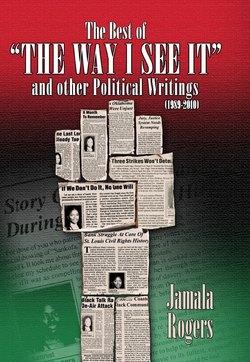Читать книгу The Best of "The Way I See It" and Other Political Writings (1989-2010) - Jamala Rogers - Страница 22
На сайте Литреса книга снята с продажи.
From Blackface to Black Faces
ОглавлениеMarch, 2002
As Hollywood gets ready to give top honors in the movie industry, black folks cross their fingers and toes that we will be duly represented among the Oscar recipients. Historically, Tinsel Town has looked over great performances by African American actors and actresses. I say “looked over” as opposed to over-looked because overlooked implies an honest mistake. If we look at our relationship with the Academy of Arts and Science since its founding in 1927, it may reveal what we can realistically expect on Oscar night.
Our struggle to get into Hollywood has been a tortuous one, from blackface to black faces. The Oscar committee looks at these movies through the eyes of individuals. Race and gender of actors, the subject matter, and the conditions going on in the world at the time determine their choices. There have even been times when total subjectivism colored awards to white actors. For example, many observers believe that James Stewart’s Best Actor award in “Philadelphia Story” was a sympathy vote because Stewart lost out the year before in “Mr. Smith Goes to Washington.” Elizabeth Taylor was given Best Actress for her role in Butterfield 8 because of a near fatal illness.
This kind of sympathy never seems to be extended to blacks. This year for only the second time in Academy history, three of the Best Actor and Best Actress nominees are African American performers. There is Denzel Washington in Training Day, Will Smith in Ali, and Halle Berry in Monsters Ball. This happened for the first time in 1972 when Paul Winfield and Cicely Tyson were nominated for their starring roles in Sounder and Diana Ross was nominated for her leading role in Lady Sings the Blues. Paul, Cicely (one of my personal favorites) and Diana all walked away empty-handed that year. Some of you may be thinking, “Didn’t we win something in 1985 with the mega hit, The Color Purple?” Uh-uh, that was a mix of leading and supporting roles. Whoopi Goldberg was nominated as Best Actress, while Margaret Avery and Oprah Winfrey were nominated for Best Supporting Actress. They, too, went home disappointed. All three, plus Danny Glover, had stellar performances in The Color Purple, which received Oscar wins in several other categories.
Here is the short of it. In the almost seventy-five years since the Academy has been picking, their pickings of us have been slim. Only 39 nominations for lead or supporting roles by black actors and actresses have been made during that time. For Black Trivians, you know that Hattie McDaniels was the first African American to win an Oscar. She got Best Supporting Actress for her role in Gone with the Wind. Another Oscaree didn’t come along until Sidney Poitier in 1963. He was the first and only black actor ever to win a Best Actor. That’s one for the brothers and zero for the sisters. In the last 20 years, Lou Gossett, Jr., Denzel Washington, Cuba Gooding, Jr., and Whoopi Goldberg have received Oscars for their supporting roles. By the looks of what roles and what movies receive Oscar honors, one might conclude that serious acting, with a positive role and plot is a dead give-away that no Oscar should be expected by black artists. I’m talking about roles like Denzel in Malcolm X and Hurricane, Angela Bassett in What’s Love Got to Do with It, and many others throughout movie history.
If I had only one chip to play now, I’d put it on Will Smith in Ali, so that an honorable figure such as Muhammad Ali would be elevated on yet another plateau. Odds are that a renegade cop running amuck or a spineless female whose breasts received more attention than her acting are more likely winners - if we have any.
Postscript: Will Smith was nominated for his role as Muhammad Ali but Best Actor went to Denzel Washington for his role in Training Day. Halle Berry won Best Actress in Monster’s Ball.
